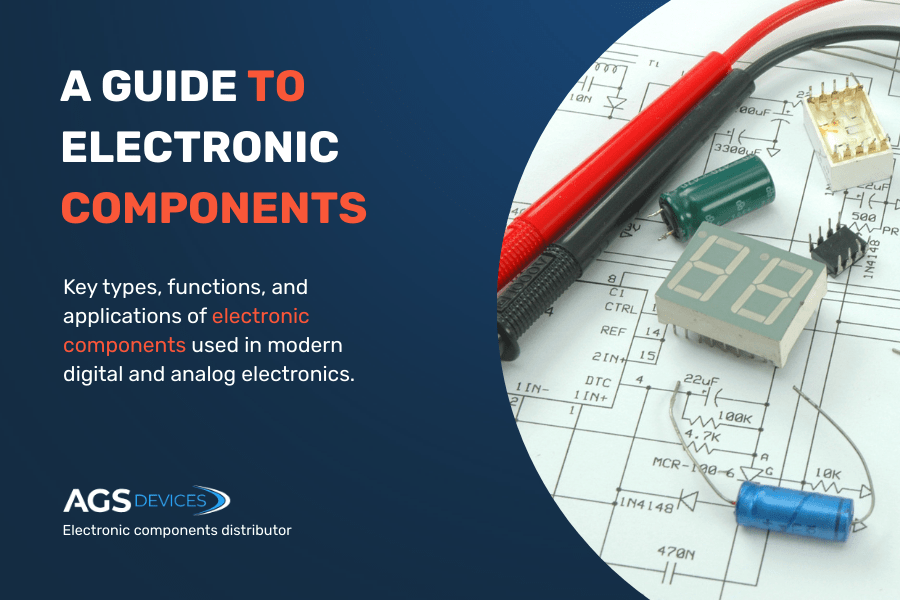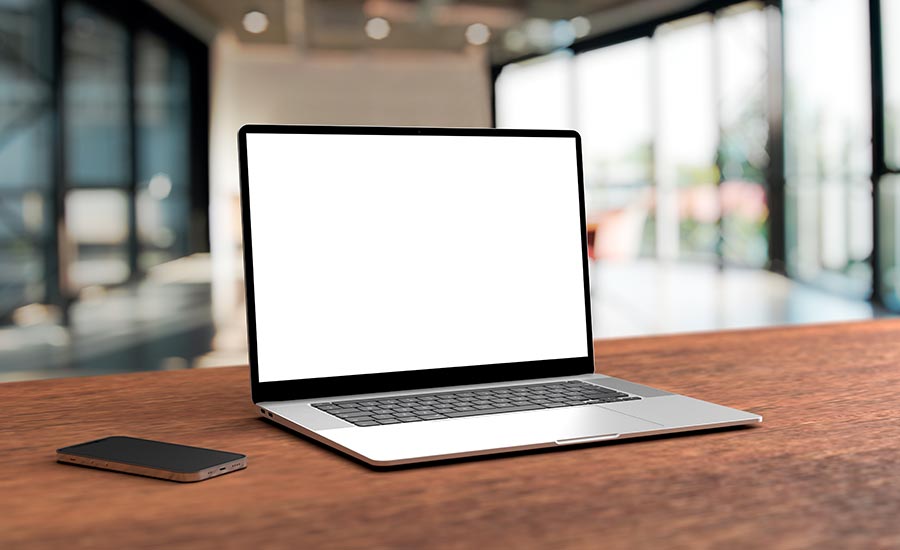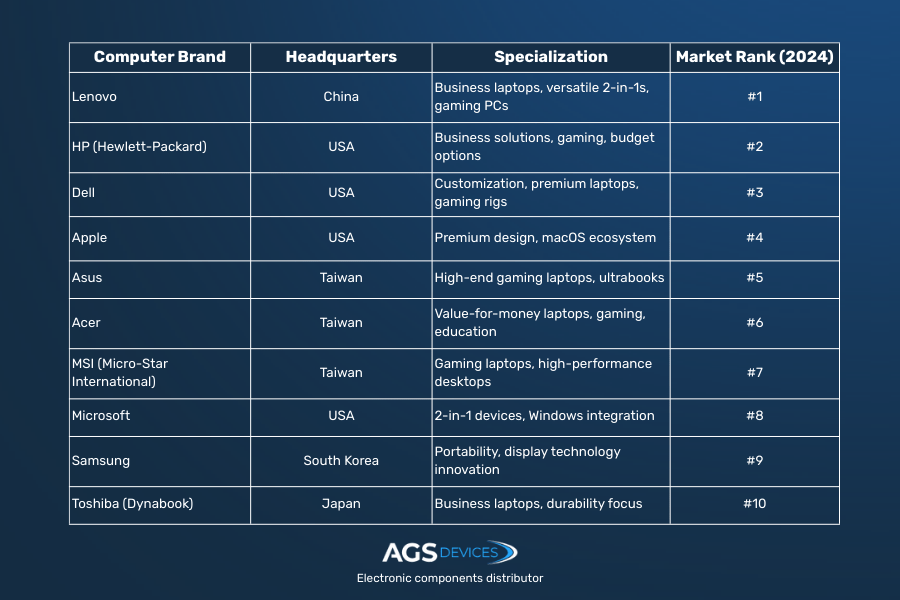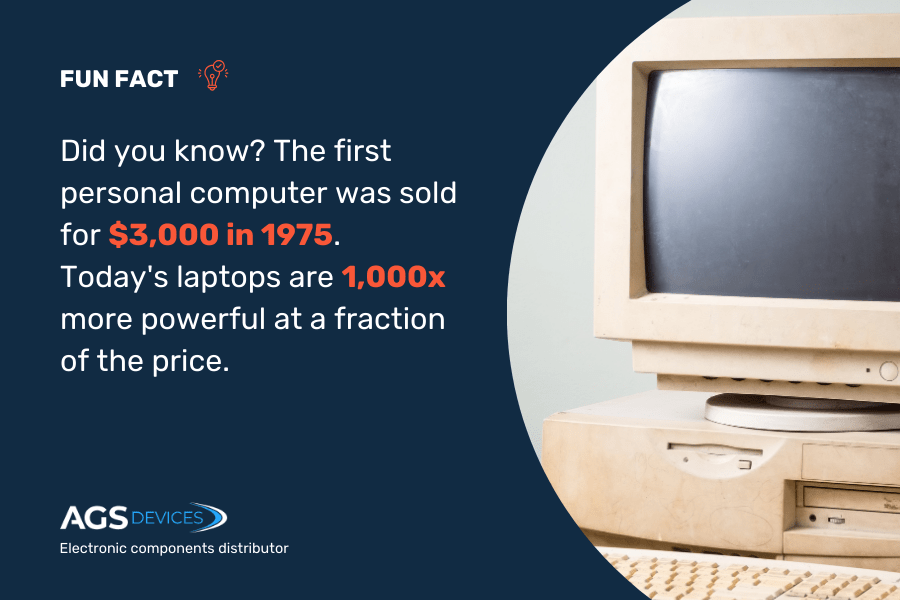
Top Computer Manufacturers: Key Points
- Apple, Dell, Lenovo, and HP drive the global PC market as they capture over 60% of worldwide sales through constant innovation, premium design, and advanced hardware solutions
- Modern laptops cost anywhere from $300 to $2,000, depending on the configuration, but they offer literally thousands of times more computing power than early PC
- Companies are using recycled materials, greener packaging, and carbon-neutral initiatives to meet environmental goals
- Quality electronic components and manufacturing (like semiconductor manufacturing, capacitors, and connectors) are the foundation of every reliable, cutting-edge device
Fueled by innovation, consumer demand, and rapid digital transformation, the global computer market is booming.
In fact, worldwide PC shipments totaled nearly 69 million units in 2024, signaling strong recovery and new growth opportunities across sectors.
In this guide, we’ll cover:
- The global PC market overview and current trends
- A breakdown of the top computer manufacturing companies in 2025
- Key factors driving growth and innovation in the industry
- How companies are improving sustainability and environmental responsibility
- Why high-quality electronic components are essential for modern computing
Global PC Market Overview
he global PC market encompasses a wide range of personal computing devices that cater to various consumer and business needs, like desktops, laptops, and tablets.
This market is influenced by several key factors and trends:
- Market dynamics: The global PC market has experienced fluctuations over the years. Initially, there was a surge in demand, notably for laptops and tablets, due to remote work and online learning during COVID-19. Recently, the market has become more stable as the world adapts to new norms.
- Innovation and product development: Manufacturers keep innovating to meet consumer needs, offering lightweight laptops, versatile 2-in-1 devices, and powerful gaming PCs. They focus on improving processor technology, battery life, and quality assurance.
- Consumer preferences: The market is shaped by widely varying consumer preferences. Some users prioritize portability and battery life, while others need high-performance devices for gaming or professional work. There’s also a growing interest in environmentally friendly and sustainable PCs.
- Business and education sectors: These sectors remain significant market drivers, with companies and educational institutions regularly updating their hardware for security, functionality, and efficiency.
- Impact of global events: Events like the COVID-19 pandemic have had a considerable impact by not only boosting demand due to remote work but also disrupting supply chains. Similarly, geopolitical events can affect production and distribution.
- Competition and market players: Key players in the market, such as Lenovo, HP, Dell, Apple, and Asus, face stiff competition and are constantly striving to outshine each other in innovation, pricing, and brand reputation.
- Emerging technologies: Technologies like AI, VR, and cloud computing are influencing the PC market, leading to new product categories and use cases.
Top 10 Computer Companies in 2025
The global market is filled with competitive computer brands and manufacturers, each offering unique strengths across different product categories. From business laptops to gaming rigs, PC brands constantly innovate to meet evolving demands.
Here are the top 10 computer manufacturing companies:
Apple
Apple is renowned for its sleek design, high build quality, and seamless integration of hardware and software. They’re known for being one of the best computer brands in the world. Their macOS is user-friendly and syncs effortlessly with other Apple products to create an ecosystem that appeals to a loyal customer base.
The MacBook Air and MacBook Pro are flagship models known for their performance, retina displays, and extended battery life. The iMac stands out for its all-in-one design and powerful computing capabilities.
Dell
Dell offers a wide range of computers that cater to all segments, from budget-friendly options to high-end gaming rigs. They’re known for their customizable configurations, robust after-sales support, and rank among the top PC manufacturers for customization and service.
Ideal for professionals, the XPS series is highly praised for its performance and design. The Alienware line is popular among gamers for its powerful specs and unique aesthetics.
Lenovo
Lenovo is noted for its innovative designs and reliability. They offer a broad spectrum of computers, from business-class laptops to gaming PCs.
The ThinkPad series is celebrated for its durability and excellent keyboard, making it a favorite in the corporate world. The Yoga series stands out for its versatile 2-in-1 design.
HP (Hewlett-Packard)
HP offers a diverse portfolio, including affordable, mid-range, and premium computers. They’re known for their reliability and performance.
The HP Spectre x360 is a top-tier laptop with a stunning design and powerful performance. The Omen series caters to gamers with high-end specs and robust build quality.
Asus
Asus is recognized for its combination of affordability and performance. They are particularly popular for their gaming laptops and motherboards.
The ROG (Republic of Gamers) series is acclaimed for its powerful gaming laptops. The ZenBook series offers sleek ultrabooks with impressive battery life and performance.

Acer
Acer is known for providing value-for-money computers, offering a wide range of laptops and desktops for both casual and power users.
The Acer Swift series are popular ultrabooks that offer a great balance of performance and portability. The Predator line is well-received in the gaming community for its powerful features.
Microsoft
Microsoft has made a mark with its Surface line of devices, known for their sleek designs, versatility, and integration with Windows OS.
The Surface Pro is a standout 2-in-1 laptop/tablet with excellent build quality and performance. The Surface Book offers a unique detachable design, serving as both a laptop and a tablet.
Samsung
Samsung is recognized for its innovation in display technology and integration with its device ecosystem. The Galaxy Book series offers portable and stylish laptops with high-quality displays. The Samsung Chromebooks are also popular for their affordability and integration with the Android ecosystem.
Toshiba
Toshiba has a reputation for producing durable and reliable laptops, particularly popular in the business and education sectors. The Portégé and Tecra series are well-regarded for their sturdy build and business-friendly features.
MSI (Micro-Star International)
MSI is primarily known for its gaming laptops and desktops, with a focus on high performance and cutting-edge technology. The MSI Gaming series, especially the GT, GS, and GE lines, is celebrated for its powerful gaming performance and innovative cooling systems.

Factors Influencing the Growth of the Global Computer Market
In today’s rapidly evolving digital landscape, several key factors are driving the growth of the global computer market, significantly influencing its future trajectory.
These factors include:
1. Technological Advancements
Continuous technological advancements, such as faster processors, better graphics, and improved battery life, drive the global computer market. These innovations make computers more efficient, capable, and appealing to a broader audience.
For example, some of the innovations include the transition to solid-state drives (SSDs) for faster data access, the introduction of advanced CPUs and GPUs for enhanced computing power, and long battery lives for laptops.
They all contribute to making modern computers and laptops not only more powerful but also more user-friendly and energy efficient.
2. Rising Demand for High-Performance Computing
The need for high-performance computing in areas like scientific research, data analysis, and complex simulations fuels market growth. Businesses and institutions need powerful computers to handle large datasets and intensive tasks.
For example, the growing demand for high-performance computing is demonstrated by the increasing use of workstations for 3D rendering, video editing, and AI applications and proves the fast expansion of the computer market.
3. Growth in Remote Work and E-Learning
The shift to remote work and the expansion of e-learning due to the COVID-19 pandemic have significantly increased the demand for personal computers. This has led to higher sales of laptops and tablets for home offices and online classrooms, along with necessary peripherals like webcams and microphones.
4. Expansion of the Gaming Industry
The booming gaming industry requires computers with high-end graphics and processing capabilities, leading to a surge in demand for gaming PCs and laptops.
Reflecting this trend, specialized gaming laptops and desktops are increasingly outfitted with advanced GPUs and high-refresh-rate monitors that cater to a gaming audience that continues to grow yearly.

5. Need for Advanced Enterprise Solutions
Enterprises are investing in advanced computing solutions for better data management, security, and operational efficiency.
For example, there’s a rising adoption of powerful servers for data centers and high-performance desktops designed for intensive business applications.
6. Evolving Consumer Preferences
Consumer preferences are shifting toward more portable, energy-efficient, and aesthetically pleasing devices, influencing manufacturers to innovate accordingly.
This trend is evident in the rising popularity of sleek, lightweight ultrabooks and 2-in-1 devices.
7. Introduction of Innovative Features in PCs
The introduction of innovative features like touchscreens, facial recognition, and virtual reality compatibility makes PCs more versatile and attractive to consumers.
The growing availability of touchscreen laptops, PCs equipped with built-in AI assistants, and VR-ready gaming rigs reflect this innovation.
Development of Cost-Effective Computing Solutions
The development of cost-effective computing solutions makes technology more accessible to a wider audience and expands the market.
This trend is particularly evident in the increasing availability of affordable Chromebooks and budget-friendly laptops, which hold strong appeal in emerging markets and among price-sensitive consumers.
Sustainability and Environmental Responsibility of Computer Companies
Recently, sustainability and environmental responsibility have become increasingly important in the computer industry. Companies are recognizing the impact their operations have on the environment and are taking steps to mitigate this.
Several key areas highlight how computer companies are addressing sustainability:
1. Reducing Carbon Footprint
Many computer companies are striving to reduce their carbon footprint by implementing more energy-efficient manufacturing processes, using renewable energy sources, and designing products that consume less power.
For example, Apple has committed to becoming 100% carbon neutral for its supply chain and products by 2030.
2. Eco-Friendly Materials
There’s a growing trend toward using recycled and sustainable materials in the production of computers and accessories.
For example, Dell uses recycled plastics collected from oceans in some of its laptop models, while HP has committed to increasing the content of its products’ recycled materials.
3. Packaging and Waste Reduction
Reducing waste, particularly in packaging, is another significant focus. Companies are designing smaller, lighter packaging using recycled or sustainable materials. This not only minimizes waste but also reduces shipping emissions.
Lenovo, for instance, has made efforts to reduce packaging waste through smarter design.
4. Energy-Efficient Products
Computer companies are continuously innovating to make their products more energy efficient. This includes developing processors that perform better while consuming less power and designing software that optimizes battery life in laptops and tablets.
Computer Companies: Key Takeaways
- Leading brands shape the future of computing: Apple, Dell, Lenovo, HP, and others continue to drive innovation and define user experiences worldwide.
- The industry is growing beyond traditional PCs: Gaming, remote work solutions, and eco-friendly devices are creating new demand segments.
- Sustainability efforts are more important than ever: Manufacturers are investing heavily in reducing emissions, improving energy efficiency, and recycling programs.
- Global events continue to impact supply chains: Companies are adapting to new challenges in sourcing, logistics, and production efficiency.
AGS Devices: A Trusted Company for Distribution of Electronic Components
At AGS Devices, we specialize in distributing advanced semiconductors which are the building blocks of modern electronics used in everything from computing to power management.
Our distribution process is comprehensive, involving rigorous incoming inspections and thorough verification checks for authenticity and performance.
We also distribute electronic components such as:
- Power Supply Distributors
- Optoelectronics
- Circuit Protection
- Interconnects
- Passive Components Electronics
- Electronic Testing Equipment
- Electromechanical Devices
We know how crucial reliable components are in electronics. Every item we distribute is carefully chosen to improve the performance of your projects, ensuring your end products work perfectly.
As a key player in the dynamic field of electronic component distribution, AGS Devices is committed to improving both the efficiency and reliability of your supply chain.
FAQs About Computer Companies
If we haven’t answered all your questions above, here are some questions you might be asking yourself.
What are the best computer brands today?
Today, some of the best computer brands include Apple, Dell, Lenovo, HP, and Asus. These top computer companies are known for their innovation, reliability, and strong customer satisfaction across both consumer and business markets.
Which computer brands are made in the USA?
While most computer manufacturers produce devices overseas, there are a few American-made computers. Companies like Dell, HP (partially), System76, and Falcon Northwest build or assemble some products in the USA, especially in high-end or custom markets.
What are the top gaming computer companies?
The top gaming computer companies include Alienware (by Dell), MSI, ASUS ROG (Republic of Gamers), and Acer Predator. These PC brands specialize in high-performance desktops and laptops built for gamers seeking top-tier graphics, speed, and cooling.
What are some examples of old computer brands from the 90s?
Popular computer brands from the 90s include Packard Bell, Compaq, Gateway, and IBM. These computer companies helped shape the early personal computer market with the bulky desktops and CRT monitors that defined the era.
Who are the largest computer manufacturers in the world?
The largest computer manufacturers today are Lenovo, HP, Dell, Apple, and Asus. These computer hardware companies dominate the global PC market with strong product lineups ranging from consumer laptops to enterprise workstations.
What are different types of computer brands?
There are several types of computer brands, including laptop manufacturers (like Acer and Microsoft Surface), gaming PC brands (such as Alienware and MSI), and industrial computer manufacturers (like Advantech and Siemens) serving specialized industries.
